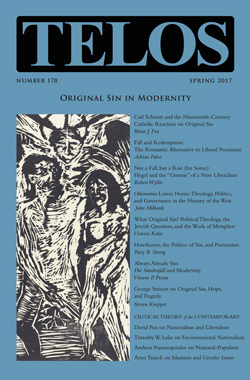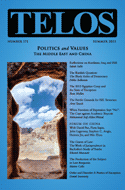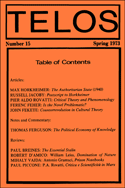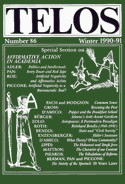By Wayne Hudson and Arran Gare · Tuesday, February 6, 2018 For a New Naturalism, edited by Arran Gare and Wayne Hudson, is now available from Telos Press in our online store. Order your copy today and save 20% on the list price by using the coupon code BOOKS20 during the checkout process.
Contemporary political and social theory needs to be rethought with reference to posthistorical conditions and developments in the natural sciences. More emphasis needs to be placed on a wider naturalism that goes beyond modern objectivating naturalism: a naturalism that opens up to both differential naturalisms and to differential humanities. In place of critique without concrete alternatives and American identity politics, a version of enlightenment is needed that stands for the rational reform of human affairs in all areas. This enlightenment is not the mainstream European Enlightenment of the eighteenth century. It is not hostile to indigenous and premodern social traditions, but seeks to learn from them. Nor is it confined to Western social thought or to a political thought based on the citizens of cities. This enlightenment engages with the sciences and with global historical dynamics.
Continue reading →
By Russell A. Berman · Monday, April 3, 2017 In addition to its main focus on original sin in modernity, Telos 178 (Spring 2017) features a special section of topical writing, introduced here by Russell A. Berman, that continues our ongoing commitment to setting forth a critical theory of the contemporary. Telos 178 is now available for purchase in our store.
 Not that long ago, debates over politics were anchored in a clear opposition between universalism and relativism. Proponents of an inclusive structure of, at least aspirationally, all states—the new world order—envisioned an unchallenged entrenchment of democratic capitalism everywhere. Where dictatorships endured, as in North Korea, they were treated as bizarre outliers, exceptions that proved the rule of the progress of mankind toward Kant’s perpetual peace. Universalist values held sway; ultimately all rights were to become human rights, due to all humans solely on the basis of their humanity, implying that rights pursuant to national citizenship, to membership in any particular national community, would dwindle in significance: no borders, no sovereignty, no traditions. However this conceptual expression of globalization faced sophisticated critics, variously postmodern, which treated that universalism with disdain and suspicion, insinuating to it an imperial agenda and offering an alternative program of multiplicity, diversity, and multipolarity. That was the historical moment of the theoretical opposition between Habermas and Derrida, the universality of communicative reason versus the insistence on difference. Inclusion and integration stood opposed to multiculturalism, as did generally applicable norms to the particular claims of local culture and tradition. Not that long ago, debates over politics were anchored in a clear opposition between universalism and relativism. Proponents of an inclusive structure of, at least aspirationally, all states—the new world order—envisioned an unchallenged entrenchment of democratic capitalism everywhere. Where dictatorships endured, as in North Korea, they were treated as bizarre outliers, exceptions that proved the rule of the progress of mankind toward Kant’s perpetual peace. Universalist values held sway; ultimately all rights were to become human rights, due to all humans solely on the basis of their humanity, implying that rights pursuant to national citizenship, to membership in any particular national community, would dwindle in significance: no borders, no sovereignty, no traditions. However this conceptual expression of globalization faced sophisticated critics, variously postmodern, which treated that universalism with disdain and suspicion, insinuating to it an imperial agenda and offering an alternative program of multiplicity, diversity, and multipolarity. That was the historical moment of the theoretical opposition between Habermas and Derrida, the universality of communicative reason versus the insistence on difference. Inclusion and integration stood opposed to multiculturalism, as did generally applicable norms to the particular claims of local culture and tradition.
Continue reading →
By Thorsten Fuchshuber · Thursday, March 24, 2016 If we want to gain a deeper understanding of the specific relationship between the ethical and the political in current times, we have to talk about the mediating agencies that enable this relationship. And if what the announcement for the Telos Conference 2016 in New York states were really true, namely, that at “the theoretical level, political reality has come to be seen as divorced from ethical life,” we need to ask: what has happened to these mediating agencies? That is exactly what the German philosopher Max Horkheimer was doing with his racket theory. He never explicitly referenced the “ethical” as a philosophical category. Yet he was able to show that in post-liberal societies, the social instances that made the relationship between the political and the ethical possible in the first place, are being destroyed—or they are at least tending towards a loss of their reflexive function. For Horkheimer this is at the core of what he called the racket society: that ultimately, every reference to universality and to society, or in German to the Allgemeinheit, is lost.
Continue reading →
By Matteo Calla · Thursday, July 30, 2015  This article places Benjamin’s late work in dialogue with recent attempts in media theory and structuralism to think the subject and historical contingency together. It argues their apparent incompatibility is reflected in Benjamin’s writing in the form of a recurrent contradiction between historical materialism and transhistorical theology. Through a reconstruction of the theorist’s historicization of an earlier theological theory of the fall of language in his Marxian-inflected work of the 1930’s, it claims that Benjamin initiates a historicist reconceptualization of the impasse of the Kantian subject onto being as the product of a particular field of mediation arising with mass modernity. Yet following the rejection of his nascent version of the Arcades Project by Adorno and the Marxist Institute for Social Research in 1938, theology returns as an attempt to reconceive of an aesthetic-formal break with this impasse. Benjamin’s late theorization of his materialist historiography thus represents a dialectical attempt to think materialism and theology, history and being together, with the aim of mediating not only distraction, but a revolutionary destruction of the subject and the historical order producing it. This article places Benjamin’s late work in dialogue with recent attempts in media theory and structuralism to think the subject and historical contingency together. It argues their apparent incompatibility is reflected in Benjamin’s writing in the form of a recurrent contradiction between historical materialism and transhistorical theology. Through a reconstruction of the theorist’s historicization of an earlier theological theory of the fall of language in his Marxian-inflected work of the 1930’s, it claims that Benjamin initiates a historicist reconceptualization of the impasse of the Kantian subject onto being as the product of a particular field of mediation arising with mass modernity. Yet following the rejection of his nascent version of the Arcades Project by Adorno and the Marxist Institute for Social Research in 1938, theology returns as an attempt to reconceive of an aesthetic-formal break with this impasse. Benjamin’s late theorization of his materialist historiography thus represents a dialectical attempt to think materialism and theology, history and being together, with the aim of mediating not only distraction, but a revolutionary destruction of the subject and the historical order producing it.
Continue reading →
By Lewis West · Friday, February 27, 2015  In November 1939, gangs of German civilians and Nazi operatives stormed Jewish stores, synagogues, and homes, killing or arresting those who could not escape. The Nazi leadership had carefully planned the assault—Kristallnacht would become only one among many instances of unimaginable horror. In the coming years, the Nazis proceeded to murder thousands of disabled Germans; when Germany invaded Russia, groups of special units—known as Einsatzgruppen—followed closely behind the German army, liquidating Jews, Communists, and Roma.[1] By 1942, the Nazi death camps had initiated yet another gruesome and terrifying phase of the Reich’s program of anti-Semitism and racial purity.[2] In November 1939, gangs of German civilians and Nazi operatives stormed Jewish stores, synagogues, and homes, killing or arresting those who could not escape. The Nazi leadership had carefully planned the assault—Kristallnacht would become only one among many instances of unimaginable horror. In the coming years, the Nazis proceeded to murder thousands of disabled Germans; when Germany invaded Russia, groups of special units—known as Einsatzgruppen—followed closely behind the German army, liquidating Jews, Communists, and Roma.[1] By 1942, the Nazi death camps had initiated yet another gruesome and terrifying phase of the Reich’s program of anti-Semitism and racial purity.[2]
Continue reading →
By Lukas Szrot · Tuesday, November 25, 2014 As Popper has written in several articles and his autobiography, he encountered Marxism as a young man in Austria around 1919. For two or three months he called himself a communist, but soon turned against the doctrine after the deaths of pro-communist demonstrators was justified with what Popper considered pseudo-scientific jargon. These events made him a fallibilist acutely aware of the distinction between dogmatic and critical thinking. (34)
 This emotionally powerful and philosophically significant experience colored Popper’s views of Marxism, the call for revolutionary social change, and the utopianism that foments it. In light of this, it is not difficult to see why Popper and (in particular early) Critical Theorists might have found much about which to disagree. Robert D’Amico discusses myriad points of contrast between Karl Popper and the Frankfurt School, though from the outset he acknowledges that the “infamous ‘methodology dispute’ in German sociology that occurred primarily between Popper and Adorno . . . is best described as a misfire” (33). Despite this alleged “misfire,” D’Amico’s analysis raises profound questions that continue to gain attention and prod ongoing debate in terms of the philosophy, theory, and methodology of the social sciences. This emotionally powerful and philosophically significant experience colored Popper’s views of Marxism, the call for revolutionary social change, and the utopianism that foments it. In light of this, it is not difficult to see why Popper and (in particular early) Critical Theorists might have found much about which to disagree. Robert D’Amico discusses myriad points of contrast between Karl Popper and the Frankfurt School, though from the outset he acknowledges that the “infamous ‘methodology dispute’ in German sociology that occurred primarily between Popper and Adorno . . . is best described as a misfire” (33). Despite this alleged “misfire,” D’Amico’s analysis raises profound questions that continue to gain attention and prod ongoing debate in terms of the philosophy, theory, and methodology of the social sciences.
Continue reading →
|
|

 This article places Benjamin’s late work in dialogue with recent attempts in media theory and structuralism to think the subject and historical contingency together. It argues their apparent incompatibility is reflected in Benjamin’s writing in the form of a recurrent contradiction between historical materialism and transhistorical theology. Through a reconstruction of the theorist’s historicization of an earlier theological theory of the fall of language in his Marxian-inflected work of the 1930’s, it claims that Benjamin initiates a historicist reconceptualization of the impasse of the Kantian subject onto being as the product of a particular field of mediation arising with mass modernity. Yet following the rejection of his nascent version of the Arcades Project by Adorno and the Marxist Institute for Social Research in 1938, theology returns as an attempt to reconceive of an aesthetic-formal break with this impasse. Benjamin’s late theorization of his materialist historiography thus represents a dialectical attempt to think materialism and theology, history and being together, with the aim of mediating not only distraction, but a revolutionary destruction of the subject and the historical order producing it.
This article places Benjamin’s late work in dialogue with recent attempts in media theory and structuralism to think the subject and historical contingency together. It argues their apparent incompatibility is reflected in Benjamin’s writing in the form of a recurrent contradiction between historical materialism and transhistorical theology. Through a reconstruction of the theorist’s historicization of an earlier theological theory of the fall of language in his Marxian-inflected work of the 1930’s, it claims that Benjamin initiates a historicist reconceptualization of the impasse of the Kantian subject onto being as the product of a particular field of mediation arising with mass modernity. Yet following the rejection of his nascent version of the Arcades Project by Adorno and the Marxist Institute for Social Research in 1938, theology returns as an attempt to reconceive of an aesthetic-formal break with this impasse. Benjamin’s late theorization of his materialist historiography thus represents a dialectical attempt to think materialism and theology, history and being together, with the aim of mediating not only distraction, but a revolutionary destruction of the subject and the historical order producing it.  In November 1939, gangs of German civilians and Nazi operatives stormed Jewish stores, synagogues, and homes, killing or arresting those who could not escape. The Nazi leadership had carefully planned the assault—Kristallnacht would become only one among many instances of unimaginable horror. In the coming years, the Nazis proceeded to murder thousands of disabled Germans; when Germany invaded Russia, groups of special units—known as Einsatzgruppen—followed closely behind the German army, liquidating Jews, Communists, and Roma.[1] By 1942, the Nazi death camps had initiated yet another gruesome and terrifying phase of the Reich’s program of anti-Semitism and racial purity.[2]
In November 1939, gangs of German civilians and Nazi operatives stormed Jewish stores, synagogues, and homes, killing or arresting those who could not escape. The Nazi leadership had carefully planned the assault—Kristallnacht would become only one among many instances of unimaginable horror. In the coming years, the Nazis proceeded to murder thousands of disabled Germans; when Germany invaded Russia, groups of special units—known as Einsatzgruppen—followed closely behind the German army, liquidating Jews, Communists, and Roma.[1] By 1942, the Nazi death camps had initiated yet another gruesome and terrifying phase of the Reich’s program of anti-Semitism and racial purity.[2]  This emotionally powerful and philosophically significant experience colored Popper’s views of Marxism, the call for revolutionary social change, and the utopianism that foments it. In light of this, it is not difficult to see why Popper and (in particular early) Critical Theorists might have found much about which to disagree. Robert D’Amico discusses myriad points of contrast between Karl Popper and the Frankfurt School, though from the outset he acknowledges that the “infamous ‘methodology dispute’ in German sociology that occurred primarily between Popper and Adorno . . . is best described as a misfire” (33). Despite this alleged “misfire,” D’Amico’s analysis raises profound questions that continue to gain attention and prod ongoing debate in terms of the philosophy, theory, and methodology of the social sciences.
This emotionally powerful and philosophically significant experience colored Popper’s views of Marxism, the call for revolutionary social change, and the utopianism that foments it. In light of this, it is not difficult to see why Popper and (in particular early) Critical Theorists might have found much about which to disagree. Robert D’Amico discusses myriad points of contrast between Karl Popper and the Frankfurt School, though from the outset he acknowledges that the “infamous ‘methodology dispute’ in German sociology that occurred primarily between Popper and Adorno . . . is best described as a misfire” (33). Despite this alleged “misfire,” D’Amico’s analysis raises profound questions that continue to gain attention and prod ongoing debate in terms of the philosophy, theory, and methodology of the social sciences. 

